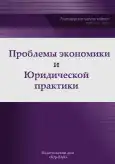Current problems of fighting corruption in the Russian Federation under the conditions of external sanction pressure
- Authors: Shkhagapsoev Z.L.1, Khamgokov M.M.1
-
Affiliations:
- North Caucasus Institute for Advanced Studies (branch) of Krasnodar University of the Ministry of Internal Affairs of Russia
- Issue: Vol 19, No 4 (2023)
- Pages: 116-120
- Section: Criminal Law
- URL: https://bakhtiniada.ru/2541-8025/article/view/145602
- EDN: https://elibrary.ru/JDBTIM
- ID: 145602
Cite item
Abstract
Currently, a large-scale sanctions policy is being pursued against the Russian Federation. It is aimed at a comprehensive limitation of international economic and political interaction. Despite the fact that sanctions are of an economic nature, their impact is much more multifaceted. Currently, the development of illegal practices of various directions under the conditions of external sanctions pressure is clearly demonstrated, which is also relevant for the formation of circumstances that contribute to the transformation of corruption manifestations in Russian society and the state. The purpose of the present study is to analyze the actual problems of combating corruption in the Russian Federation under external sanctions pressure. The authors come to the conclusion that the features of combating corruption in the context of external sanctions pressure are associated with the transformation of the illegal practice of the above-mentioned direction, which is actively carried out in the process of the influence of circumstances formed as a result of the implementation of the sanctions policy by many foreign countries as a response to geopolitical processes, currently taking place in the post-Soviet space. Ignoring these circumstances can lead to an increase in the number of acts committed and the amount of damage caused as a result of the corresponding illegal behavior. The problems identified in the presented study are of a pronounced practical nature, and therefore their prompt solution will positively affect the effectiveness of ongoing anti-corruption activities and will reduce the impact of the sanctions policy of foreign states on the development of illegal practices of corruption in the territory of the Russian state.
Full Text
##article.viewOnOriginalSite##About the authors
Zaurbi L. Shkhagapsoev
North Caucasus Institute for Advanced Studies (branch) of Krasnodar University of the Ministry of Internal Affairs of Russia
Author for correspondence.
Email: nfka599@yandex.ru
Dr. Sci. (Law), Professor, Police Colonel, Head of the Institute
Russian Federation, NalchikMuradin M. Khamgokov
North Caucasus Institute for Advanced Studies (branch) of Krasnodar University of the Ministry of Internal Affairs of Russia
Email: hamgok@mail.ru
Cand. Sci. (Law), Associate Professor, Police Colonel, head of fire training department
Russian Federation, NalchikReferences
- Alaukhova O.I. Import substitution in the context of overcoming external sanctions pressure // Bulletin of the Eurasian Science. 2022. Vol. 14. No. 3. URL: https://esj.today/PDF/26ECVN322.pdf (Date of access: 05/15/2023).
- Belykh V.S. National economic security of Russia: internal and external threats // Business, management and law. 2022. No. 3 (55). pp. 9–14.
- The head of the GUEBiPK of the Ministry of Internal Affairs: in Russia in 2022, the receipt of bribes for 1.1 billion rubles was revealed. URL: https://tass.ru/interviews/16535463 (date of access: 05/15/2023).
- Kupreshchenko N.P., Seregin V.R. The scale of corruption-related crimes by spheres and federal districts in Russia // Actual research. 2022. No. 10 (89). pp. 43–48.
- Marsakov I.S. Peculiarities of interaction between economic security and anti-corruption departments at the stage of detecting corruption-related crimes committed in the field of procurement for state and municipal needs // Philosophy of Law. 2023. No. 1 (104). P. 105.
- Marsakov I.S. Risk-oriented approach in the activities of departments of economic security and anti-corruption of internal affairs bodies in detecting crimes. Bulletin of the Saratov State Law Academy. 2023. No. 2 (151). P. 187.
- Overview of the judicial practice of considering cases of bringing to administrative responsibility, provided for in Article 19.28 of the Code of the Russian Federation on Administrative Offenses (approved by the Presidium of the Supreme Court of the Russian Federation on 07/08/2020) // Bulletin of the Supreme Court of the Russian Federation. 2020. No. 12.
- Obukhova A.S., Piyaltsev A.I. Assessment of socio-economic changes in the economy in the context of external sanctions pressure on the Russian Federation // Regional and branch economy. 2022. №4. pp. 36–41.
- Half of businessmen in Russia reported an increase in corruption against the backdrop of sanctions. URL: https://www.rbc.ru/economics/09/12/2022/639205be9a7947ba4c 087dc4 (date of access: 05/15/2023).
- Syurkova S.M., Danilina I.N., Vasilyeva P.A. Evaluation of anti-corruption measures for the country's economy // Bulletin of the TISBI University of Management. 2023. No. 1. P. 90–99.
Supplementary files








